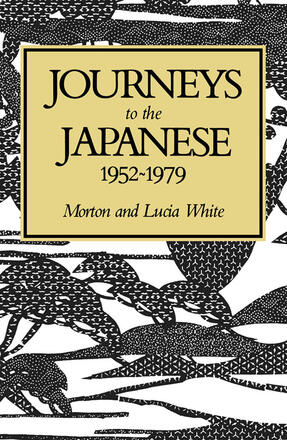
Journeys to the Japanese is an affecting account of how
lasting international sympathy and understanding can be nourished by
encouraging cultural exchange and personal friendship.
Description
Morton White, one of America's most distinguished and
intellectual historians, was among the first Western academics invited
to Japan after the Pacific War. With his wife and co- author Lucia, he
first went there in 1952 and subsequently made four more trips, the
last one in 1979. During these visits the Whites became friendly with
many Japanese intellectuals and their families and were able to observe
Japan and Japanese life during a crucial part of this century.
Through personal reminiscences based on their journals and
correspondence, the Whites introduce the reader to the great
intellectual, social, and economic changes that took place in Japan
during the nearly thirty-year span of their visits. They provide
penetrating sketches of the personalities and attitudes of an important
group of Japanese academics -- leaders who acted against the prevailing
opinion to introduce well-known intellectuals from the United States to
help break down the stereotypes created by World War II. Reflecting on
the changing trends and practices of the Japanese philosophers, the
Whites note the gradual shift in orientation from the European to the
American tradition in philosophy and comment on how this produced
tensions in the Japanese philosophers who lived through it -- issues of
great interest both for students of the history of philosophy and for
anyone interested in the spread of American influence.
Outside the precincts of the universities, the Whites are keen
observers of a culture they have come to respect and admire. The
delicacy of Japanese social arrangements, the importance of
'face,' the self-consciously problematic position of women in
Japanese society, as well as the intricate web of courtesy are given
life through many insightful examples.
In the book's final chapter, the Whites ponder upon things
Japanese they have yet to understand and how their visits have made
them more conscious of their own cultural tradition and what they
perceive as its deficiencies.
Journeys to the Japanese both entertains and informs about
an important period and significant individuals in Japanese history. It
is an affecting account of how lasting international sympathy and
understanding can be nourished by encouraging cultural exchange and
personal friendship.